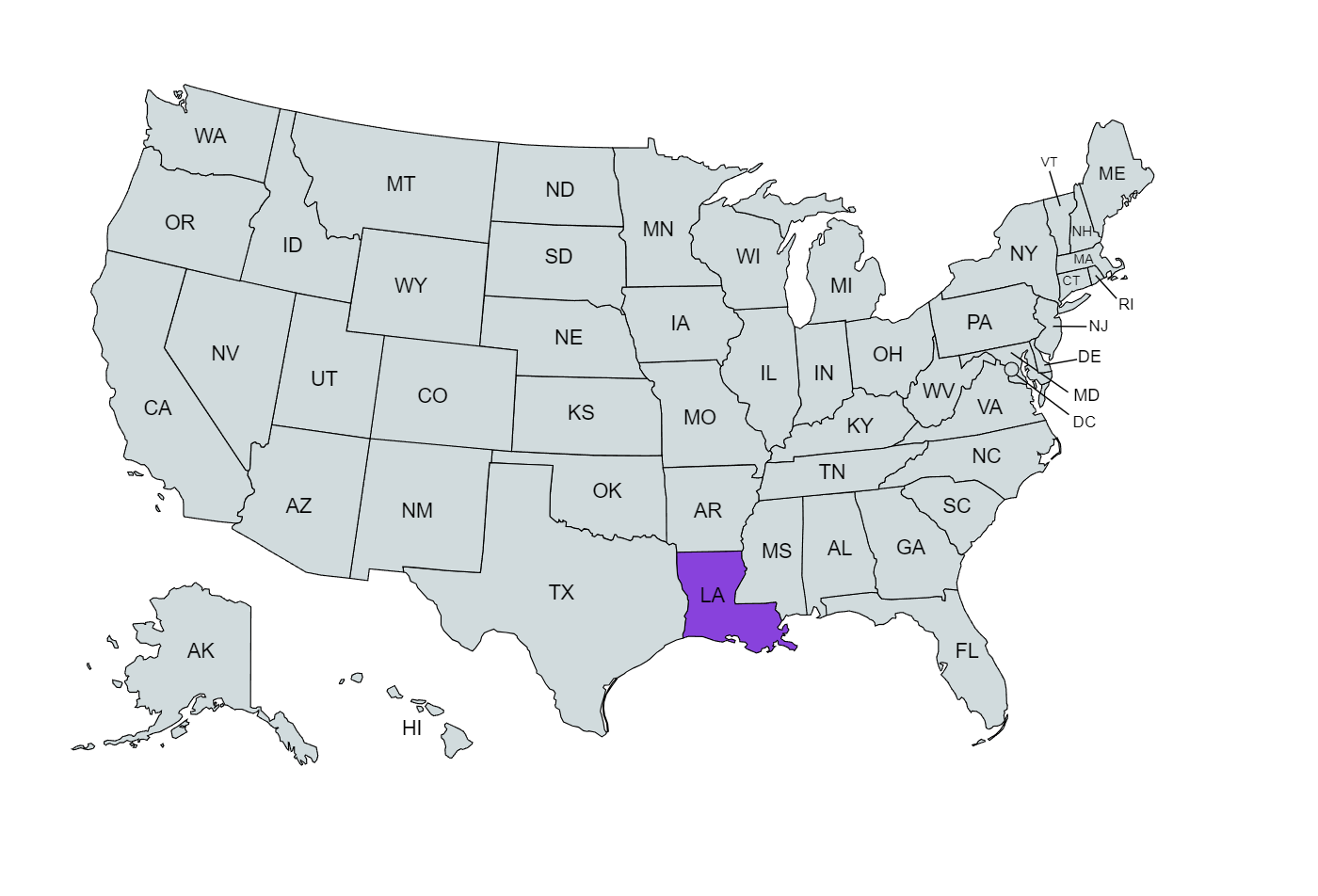Louisiana Paycheck Calculator: Calculate Your Net Pay
If you’re wondering, “How do I figure out how much money I take home in Louisiana?” we’ve got you covered.
Our simple Louisiana paycheck calculator helps you estimate your take home pay as an hourly or salaried employee in the Pelican State.
Just input your earnings and let the tool do the math to account for federal and Louisiana taxes so you can plan your budget confidently.
Louisiana Paycheck Calculator
Meanwhile, get ahead with our free resources:
How Does the Louisiana Paycheck Calculator Work?
Using the calculator is straightforward.
Enter your salary information – for example, your wage rate and pay frequency – and the tool will handle all the necessary tax calculations.
Once you’ve filled in your details, click the “Calculate Tax” button.
The calculator will then display an estimate of your net pay for the specified pay period, i.e. the amount you take home after withholding for taxes and other deductions.
It’s a quick way to see what your paycheck will look like after Louisiana state taxes (and federal taxes) are applied, without having to crunch the numbers yourself.
Overview of Louisiana Taxes
Louisiana employs a graduated individual income tax system, with rates ranging from 1.85 % to 4.25%. This is significantly lower than the highest tax bracket in many other states.
Businesses in Louisiana are subject to a corporate income tax, falling between 3.50% and 7.50%. These rates contribute to Louisiana's overall tax climate, ranking 39th on the 2023 State Business Tax Climate Index.

Sales tax in the Pelican State is 4.45% at the state level, but combined with local sales taxes, it can reach a maximum of 9.55%. However, essential items such as groceries, certain feminine hygiene products, prescription drugs and diapers are exempt at the state level.
Property taxes in Louisiana are notably low, with an average effective property tax rate of just 0.56%, making it one of the states with the lowest property tax burdens. Additionally, Louisiana does not impose estate or inheritance taxes.
Estate and Inheritance Taxes: Another tax advantage in Louisiana is the lack of estate or inheritance taxes. Louisiana imposes no state inheritance tax, and no state estate tax on inheritances.
This means when property or assets are passed on to heirs, Louisiana won’t take an extra cut – only federal estate tax laws would apply for very large estates. This friendly policy can be reassuring for those doing estate planning in the state.
Median Household Income in Louisiana
Louisiana's economic landscape is a unique blend of strengths and challenges that set it apart from the national economic trends. Despite its relatively small population, the state ranks 24th in national GDP contribution.
Louisiana's economic fortunes are closely tied to the oil industry. Approximately 24% of the state's economic output is attributed to this industry, which also sustains over 300,000 jobs.
Salaries in Louisiana vary widely based on position. However, the median household income can give you a glimpse at the average salary a household is earning in this state.
| Year | Median Household Income |
|---|---|
| 2023 | $57,650 |
| 2022 | $58,320 |
| 2021 | $57,206 |
| 2020 | $51,186 |
| 2019 | $51,707 |
| 2018 | $49,973 |
| 2017 | $43,565 |
| 2016 | $42,196 |
| 2015 | $45,922 |
| 2014 | $42,406 |
| 2013 | $46,425 |
| 2012 | $39,085 |
| 2011 | $40,658 |
Tips for Maximizing Your Lousiana Take Home Paycheck
No matter your salary, there are ways to make the most of your paycheck.
Here are some practical tips to help you maximize your take-home pay and improve your financial situation in Louisiana:
- Negotiate for higher pay when possible: Don’t hesitate to ask for a raise or negotiate a better starting salary if you have demonstrated your value. Even a small percentage increase in pay can have a big impact over time.
- Invest in skill development: Improving your qualifications or learning new in-demand skills can open doors to better-paying job opportunities. Consider certifications, training courses, or higher education that could boost your earning potential.
- Create a budget to manage expenses: Maximizing your paycheck isn’t only about increasing income – it’s also about controlling outflows. Make a monthly budget to track spending, cut unnecessary expenses, and ensure you’re living within your means. Saving on expenses effectively gives you more net take-home pay to use elsewhere.
- Seek additional income sources: If feasible, pursue a side hustle or part-time work to supplement your main job’s income. Even passive income streams (like renting out a room, freelancing on weekends, or a small online business) can increase your overall take-home pay.
- Build a professional network: Networking can lead to career growth and higher-paying opportunities. Connect with professionals in your industry, attend local Louisiana job fairs or industry events, and leverage platforms like LinkedIn. Often, who you know can help you discover better positions or get referrals that boost your career (and paycheck).
- Maximize employer-provided benefits: Take full advantage of benefits offered by your employer. For example, contribute to your 401(k) or HSA especially if the company matches contributions (it’s essentially free money), use health insurance wellness perks, and utilize any education reimbursement programs. These benefits can increase the effective value of your compensation and save you money.
By combining these strategies – earning more, spending wisely, and leveraging benefits – you can stretch your Louisiana paycheck further. Every dollar saved or gained counts, and over time these steps can significantly improve your financial health.
Remember, a paycheck calculator (like the one above) can help you plan by showing your net pay after taxes, but it’s up to you to make that net pay work for your goals. With the right approach, you can thrive financially in the Bayou State.
